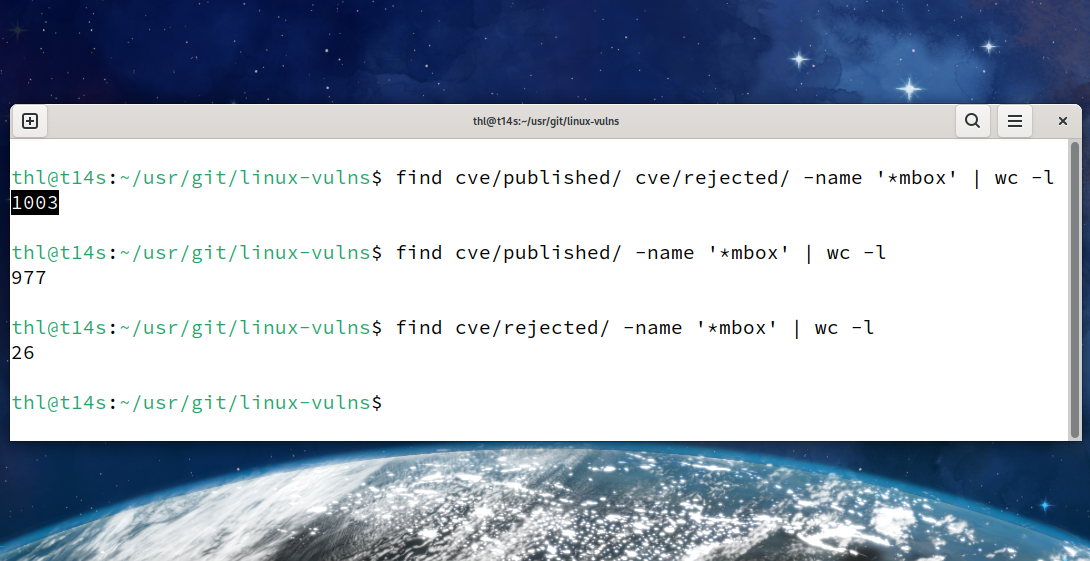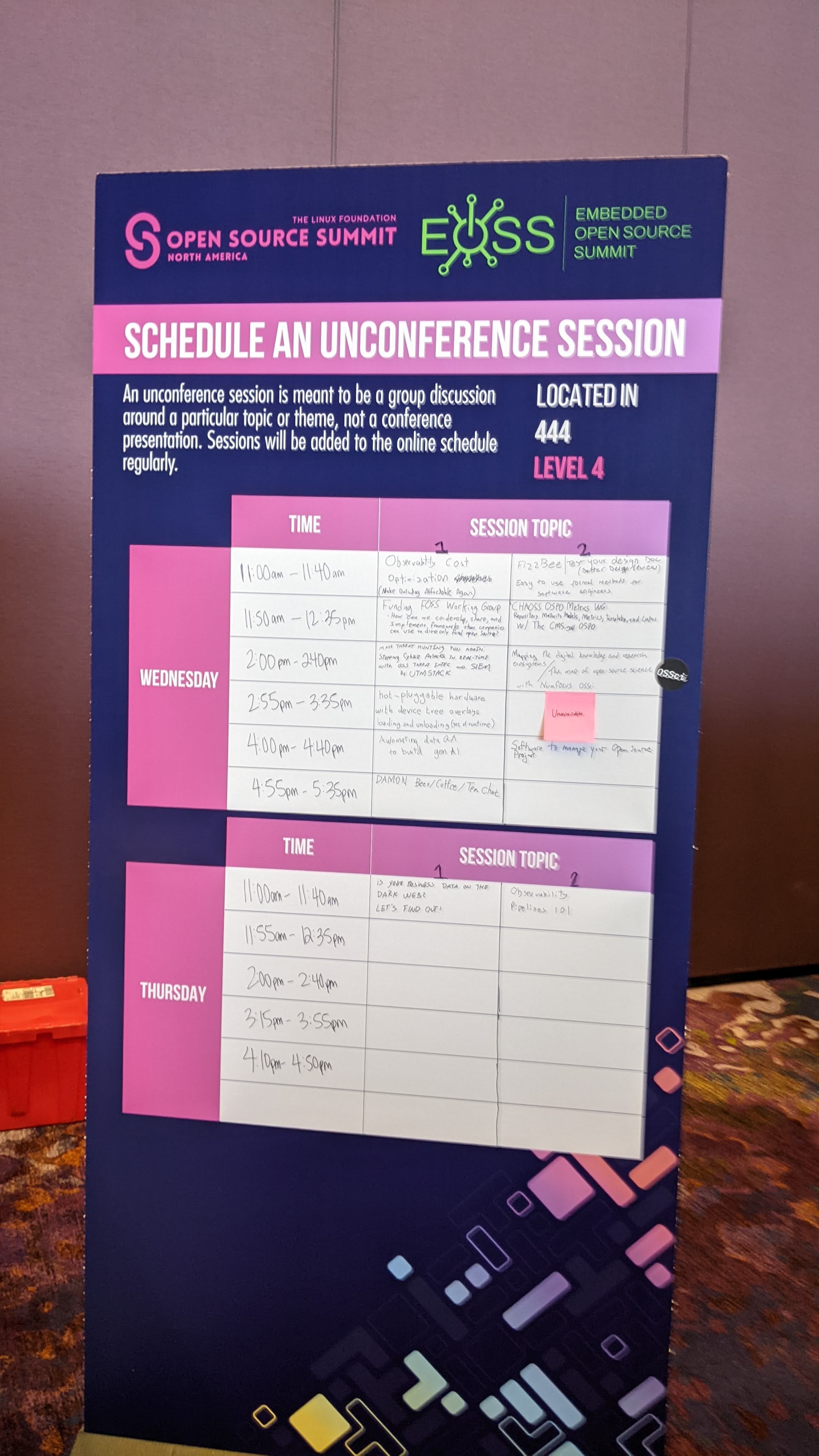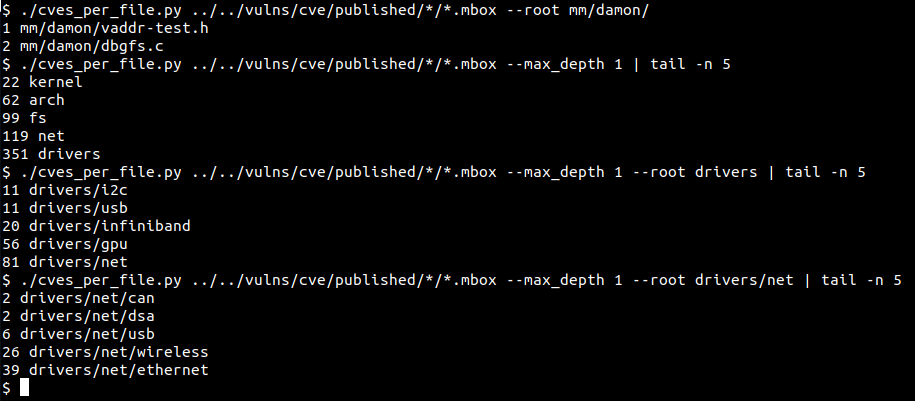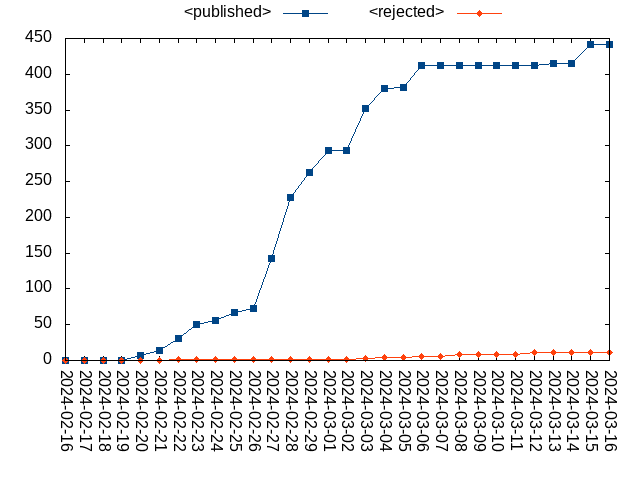Posts
252Following
42Followers
125sj
sj[1] https://github.com/damonitor/talks/blob/master/2024/lsfmmbpf/damon_lsfmmbpf_2024.pdf
[2] https://docs.google.com/spreadsheets/d/176LXLys9Uh6A-Eal2flrzcbUSJMUXGkGwyihr9jAAaQ/edit#gid=0
#linux #kernel #damon
sj
sj```
vulns$ git ls-tree 066ff87 cve/published/*/*.json cve/rejected/*/*.json | wc -l
1002
vulns$ git ls-tree 066ff87~1 cve/published/*/*.json cve/rejected/*/*.json | wc -l
959
```
And in a way of sorting the CVEs, the 1000th CVE is CVE-2024-27019 (https://lore.kernel.org/2024050150-CVE-2024-27019-e3d4@gregkh).
```
vulns$ git show 066ff875952b --stat
[...]
cve/published/2024/CVE-2024-27019.sha1 | 1 +
[...]
cve/published/2024/CVE-2024-27020.sha1 | 1 +
[...]
cve/published/2024/CVE-2024-27021.sha1 | 1 +
172 files changed, 9150 insertions(+)
```
RE: https://fosstodon.org/users/kernellogger/statuses/112364389830654403
Thorsten Leemhuis (acct. 1/4)
kernellogger@fosstodon.orgThe #Linux #kernel's #CVE team just published their thousandth CVE[1]. 🥳 🙃
This happened 78 days after the effort was announced[2].
Note, 26 of the 1003 CVE entries published so far were later rejected. For details check https://git.kernel.org/pub/scm/linux/security/vulns.git/ or https://lore.kernel.org/linux-cve-announce/
[2] http://www.kroah.com/log/blog/2024/02/13/linux-is-a-cna/ #LinuxKernel
sj
sj#linux #kernel #damon
sj
sj#linux #kernel #damon
sj
sjMore formal announcement: https://lore.kernel.org/r/20240416184044.98993-1-sj@kernel.org
#linux #kernel #damon #ossummit
sj
sj[1] https://github.com/awslabs/damo/blob/v2.3.0/release_note#L4
[2] https://github.com/awslabs/damo/blob/v2.3.0/USAGE.md#footprints
[3] https://sched.co/1aBOg
#linux #kernel #damon #damo
sj
sjI sometimes do git log --author to know developers including myself for just fun, retrospects, or interviews. It was not easy to get the whole picture with my poor brain. Hence I wrote a script: https://github.com/sjp38/lazybox/blob/master/git_helpers/profile_author.py
E.g.,
$ ./profile_author.py "SeongJae Park" --branch linus/master --repo ~/linux --max_files 10
since 2023-04-14 until 2024-04-13
# <changed_lines> <file>
746 mm/damon/sysfs-schemes.c
735 Documentation/admin-guide/mm/damon/usage.rst
646 mm/damon/core.c
522 Documentation/mm/damon/design.rst
405 tools/testing/selftests/damon/_damon_sysfs.py
291 include/linux/damon.h
273 mm/damon/sysfs.c
179 mm/damon/core-test.h
100 Documentation/ABI/testing/sysfs-kernel-mm-damon
86 mm/damon/sysfs-test.h
# 5035 total lines
# 52 total files
# 172 commits
sj
sj[1] https://github.com/sjp38/hackermail/blob/v1.0.3/USAGE.md#public-inbox-search
#hackermail
sj
sjhttps://oracle.github.io/kconfigs/?config=UTS_RELEASE&config=DAMON&config=DAMON_RECLAIM&config=DAMON_LRU_SORT
#linux #kernel #damon
RE: https://snake.club/users/brenns10/statuses/112208220192120480
Stephen Brennan
brenns10@snake.clubI made a tool to help view kernel configuration values and compare them across many Linux distributions. Here's a blog post introducing it:
https://blogs.oracle.com/linux/post/explore-linux-kernel-kconfigs
Or, you can skip right to the tool here:
https://oracle.github.io/kconfigs/
Source is available here:
https://github.com/oracle/kconfigs
sj
sj"""
To recap, the long-awaited DAMOS auto-tuning feature has merged. More people
from the academy and the industry explored and contributed on DAMON. DAMON
user-space tool got more useful features. We will have yet another DAMON
presentation and discussion at OSSummit NA and LSF/MM/BPF.
"""
#linux #kernel #damon
sj
sj[1] https://github.com/awslabs/damo/blob/v2.2.8/USAGE.md#recording-memory-footprints
#linux #kernel #damon #damo
sj
sj[1] https://github.com/sjp38/hackermail/blob/v1.0.2/release_note
[2] https://github.com/sjp38/hackermail/blob/v1.0.2/USAGE.md#drafts
#hackermail #hkml
sj
sjsj
sj[1] https://github.com/sjp38/hackermail/blob/v1.0.1/release_note
[2] https://github.com/sjp38/hackermail/blob/v1.0.1/USAGE.md#synchronizing
#hackermail #hkml
Gustavo A. R. Silva 
gustavoars@fosstodon.org
I just renewed my subscription to @LWN
The best content about bleeding-edge Linux kernel development! 🐧 🙌
You should really consider subscribing if you haven't done it yet. 🙂
sj
sjI wanted to know simple daily Linux kernel CVE statistics just for fun, so wrote a script[1] and plotted the output.
$ ./vulns_stat.sh ./vulns/ 30 | ../gnuplot/plot.py --data_fmt table --type labeled-lines --xtics_rotate -90 cve_stat_30_days.png
[1] https://github.com/sjp38/lazybox/blob/master/cve_stat/vulns_stat.sh





